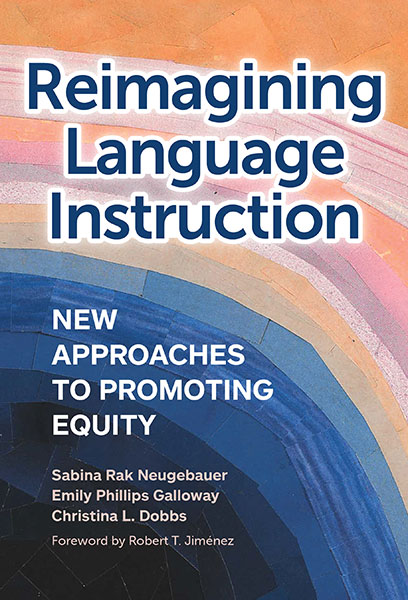Professors: Request an Exam Copy
Print copies available for US orders only. For orders outside the US, see our international distributors.
Sabina Rak Neugebauer, Emily Phillips Galloway, Christina L. Dobbs
Foreword by: Robert T. Jimenez
Publication Date: August 25, 2023
Pages: 176

Use this unique volume to transform the learning and teaching of language so that all students are empowered to succeed. This book offers insight into how to teach language—a core component of developing skilled readers and writers across all content areas—in ways that value the rich and diverse language assets students bring to the classroom. The authors provide guidance to help K–12 teachers move beyond current approaches to teaching language in the classroom to support equitable student outcomes in both linguistically diverse and linguistically homogeneous classrooms. The text provides a step-by-step process to uncover conceptions of language and its instruction that undercut opportunities to learn. Readers will gain new strategies for teaching the language of school tasks while integrating students’ distinctive language experiences as resources for learning. School leaders will learn how to implement a schoolwide exploration into teaching language that promotes equity, all while building collaboration among administrators, teachers, and students.
Book Features:
Sabina Rak Neugebauer is an associate professor of literacy in the College of Education and Human Development at Temple University. Emily Phillips Galloway is an assistant professor of multilingual learning and literacy education at Peabody College, Vanderbilt University. Christina L. Dobbs is an assistant professor and director of English education for equity and justice, at Wheelock College of Education and Human Development, Boston University.
“Teachers receive advice on how to value their students’ various linguistic capabilities and to avoid linguicism, which the authors define as ‘discrimination based on one’s language.’ Recommended.”
—CHOICE
“The ideas, information, and recommendations found in this book, Reimagining Language Instruction, are a way forward for making individuals, classrooms, and schools advocates for equity and for empowering varied linguistic communities in classrooms and beyond them.”
—From the Foreword by Robert T. Jiménez, professor emeritus, Vanderbilt University
“At a time when there are many questions about how to create language-rich environments that cultivate students’ literacy skills and their sense of self and belonging, comes a text with a framework and set of ideas and tools to do just this. This powerful author team tackles these complex questions with a clear, research-based, accessible approach. I strongly recommend this book for educators engaged in study, graduate students in education, and for those designing professional learning.”
—Nonie K. Lesaux, Larsen Professor of Education and Human Development, Harvard Graduate School of Education
“As Neugebauer, Phillips Galloway, and Dobbs explain, language instruction can be a tool for oppression and marginalization or a mechanism for empowerment. Grounded in cutting-edge research, vivid classroom examples, and a multilevel approach, this text is essential to helping K–12 educators achieve the latter.”
—Michael J. Kieffer, associate professor of literacy education, New York University
Contents
ForewordRobert T. Jiménez xi
Acknowledgments xv
1. Introduction 1
Language Awareness Inquiry 3
Conceptions That Promote Equity Versus Misconceptions That Limit Equity 4
Chapter 1 Reflection 8
Part I. Individual Inquiry: Dismantling Linguicism
2. Language Hierarchies Versus Language Resources for Learning 13
Chapter 2 Reflection 18
Conceptions That Limit Equitable Language Instruction: Language Hierarchies 18
Conceptions That Promote Equitable Language Instruction: Approaches That Resist Language Hierarchies 21
Closing Thoughts on Valuing Diverse Language Resources for Learning 30
Chapter 2 Closing Reflection 30
3. Language as a Dichotomy Versus Language as a Continuum 31
Chapter 3 Reflection 32
What Makes a Skilled Language User?: A Continuum Perspective 32
The Problem With Binaries in Language Teaching and Use 37
A Continuum Perspective to Begin Dismantling Language Hierarchies 41
Closing Thoughts on Promoting a Continuum Perspective 43
Chapter 3 Closing Reflection 43
Part II. In the Classroom: Practices That Support Linguistic Fluidity
4. Language Beyond Words 47
Chapter 4 Reflection 48
Language: The Whole Is More Than The Sum of Its Parts 49
Moving Away From Vocabulary-Based Teaching 66
Chapter 4 Closing Reflection 69
5. Promoting a Path, Not a Phase 70
Chapter 5 Reflection 70
School Text: Challenge and Opportunity 71
Classroom Language Conversations Across the Grades 78
Conceptualizing Language Awareness Across Grades 88
Chapter 5 Closing Reflection 89
Part III. Collective Inquiry: Forging Communities for Equity
6. Taking a Collaborative Approach: Supporting Equitable Language Teaching Through Teams 93
Chapter 6 Reflection 94
Collaborating for Equitable Language Teaching 95
How Successful Teacher Teams Promote Equity Through Language Teaching 96
Forming Teams 114
Collaborating With Colleagues Who Focus on a Similar Content Area 114
Collaborating With Colleagues Across the Grade Level 115
Chapter 6 Closing Reflection 117
7. Taking a Systemic Approach: Improving School Culture Through Collective Inquiry 118
Chapter 7 Reflection 119
Creating a Schoolwide Culture of Linguistic Equity 119
Learned, Changed, and Built 129
A Vision for Equitable Language Teaching 131
Final Closing Reflection 132
Glossary 133
References 137
Index 147
About the Authors 153
Professors: Request an Exam Copy
Print copies available for US orders only. For orders outside the US, see our international distributors.